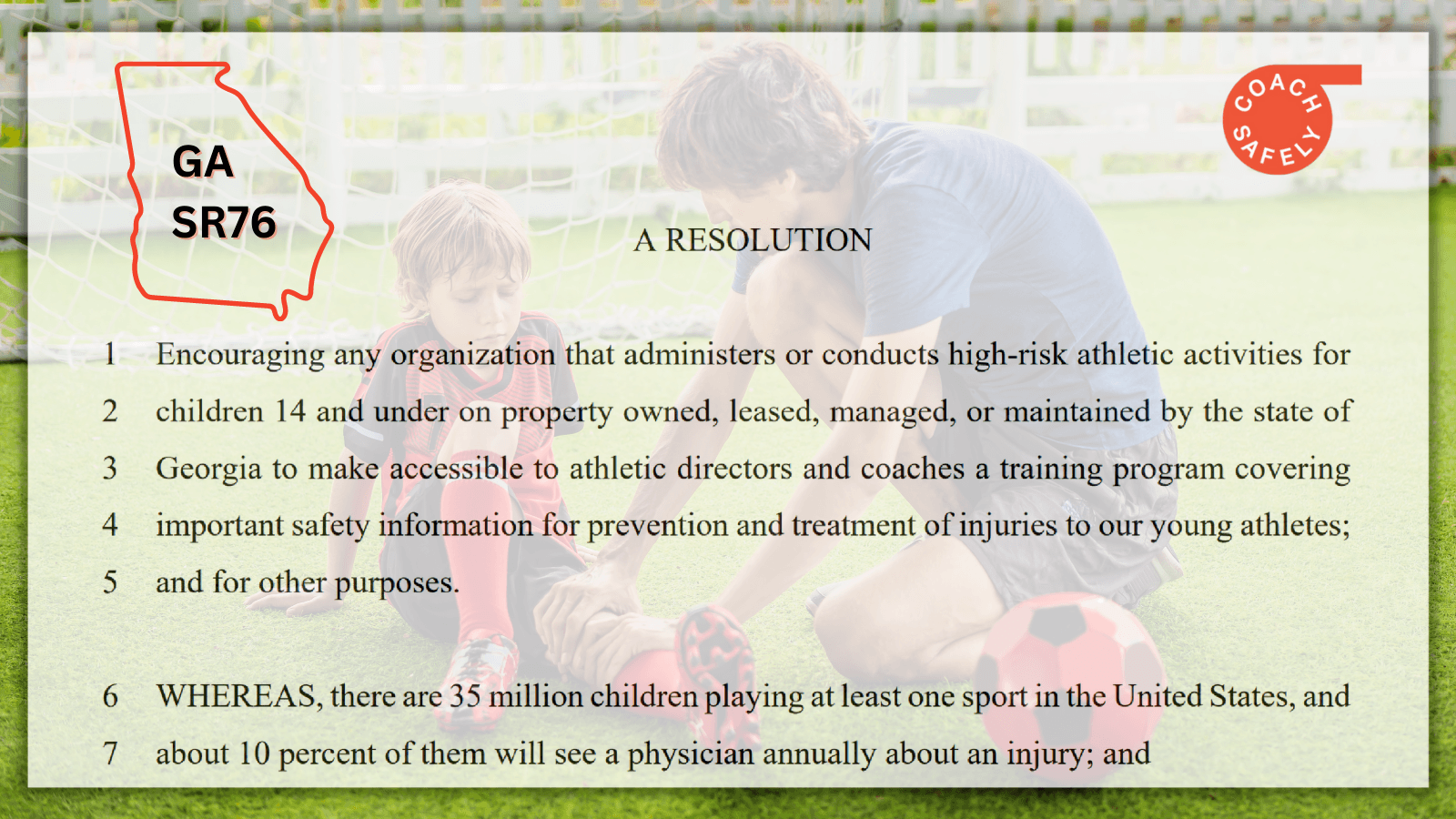
Georgia Senate resolution encourages injury prevention training for youth coaches
Georgia aligns with CoachSafely’s vision to set a national standard for youth sports safety
Georgia State Sen. Kay Kirkpatrick served as an orthopedic surgeon in metro Atlanta for more than 30 years. She is a natural advocate for keeping Georgia’s children who are involved in youth sports in the game, in the classroom and out of the emergency room. Her efforts in that field crossed the goal line last week with the unanimous passage of Georgia Senate Resolution 76.
The resolution “encourage(s) organizations that administer high-risk athletic activities for children aged 14 and under on state property make available to athletic directors and coaches a training program that covers important safety information for prevention and treatment of injuries to young athletes.”
Kirkpatrick sponsored the resolution, which was supported by the Georgia Recreation and Park Association, the Medical Association of Georgia, the Georgia High School Association and the CoachSafely Foundation. Based in Birmingham, the CoachSafely Foundation supported the passage of a 2018 law in Alabama – the Coach Safely Act – mandating injury recognition and prevention training for youth coaches. It was the first law of its kind in the United States.
The Georgia resolution, modeled after the Alabama legislation, encourages such training rather than mandating it with a similar goal in mind: To provide Georgia’s estimated 250,000 youth coaches the knowledge they need to keep their athletes active, healthy and safe.
“The Georgia Senate acted to make a strong statement about the benefits of training our youth sports coaches by passing SR 76,” Kirkpatrick said. “Raising awareness of the necessity of training these volunteers in injury prevention and basic principles of treatment will help to improve the health and safety of our children. I appreciate the help of CoachSafely in making this happen in Georgia.”
CoachSafely founder and chairman Jack Crowe said, “The CoachSafely Foundation Board has established as mission critical to affect youth sports injury prevention policy in every state. Georgia is the first.”
Professional team doctor sees the need for youth coach training
Count Dr. Kyle Hammond among those applauding the resolution’s passage. Hammond is the head team physician for the Atlanta Falcons, the head orthopedic surgeon for the Atlanta Hawks and the team orthopedic surgeon for the Atlanta Braves. He’s also a father who’s coached his twin boys and an advocate for training youth coaches who serves on the CoachSafely Foundation’s Advisory Board.
Providing youth coaches with “baseline knowledge, baseline training,” Hammond said, “is crucial” because so many of them are volunteer parents with no medical training.
“I am extremely encouraged,” Hammond said. “I am optimistic, and I think it’s probably overdue. The state of Georgia is such a wonderful state, having lived here for a long time. The amount of youth sports and the amount of athletes that are playing sports throughout all the communities in the state of Georgia are vast. To be able to implement something like this , like Alabama has and now Georgia has, hopefully it can matriculate to Florida and other states and go on from there.”
To realize its vision to set a national standard for youth sports safety, CoachSafely expanded its research, education and advocacy efforts outside of Alabama. Those efforts started across the state line in Georgia before the onset of the COVID-19 pandemic. The pandemic delayed but did not deter Kirkpatrick, who was an early driver of legislation that would result in more youth coaches completing a comprehensive course of injury recognition and prevention.
The need for the training is clear. SR 76 states, “There are 35 million children playing at least one sport in the United States, and about 10 percent of them will see a physician annually about an injury.” The good news from the Centers for Disease Control and Prevention in Atlanta: Half of those injuries are preventable through the education of coaches and parents.
Across the country to date, that kind of training is happening only on a limited basis. According to a 2021 Sports & Fitness Industry Association survey, “Less than half of youth sports coaches were trained to deliver CPR and first aid, only one-third received training in injury prevention or physical conditioning and only a quarter were trained to manage concussions.”
The injury recognition and prevention course designed by the CoachSafely Foundation and its medical advisory board, led by Dr. James R. Andrews, exceeds the standards set by the Georgia resolution and the Alabama law. It covers nine subjects – including concussions, sudden cardiac arrest and emergency preparedness – in 11 video modules. To demonstrate its efficacy, the foundation conducted a pilot program in Georgia, distributing the course at no charge to youth athletics associations such as Georgia Little League and the Sumter County Parks and Recreation Department.
CoachSafely pilot program in Georgia paves the way for the resolution
Genuine Parts Co. sponsored the pilot program. The company’s senior vice president and treasurer, Charles Chesnutt, also serves on the CoachSafely Foundation’s advisory board. He said he is encouraged that Georgia has joined Alabama to move toward setting a national standard to keep youth athletes safe.
“It’s always an important step when you go from 1 to 2,” Chesnutt said. “There is strength in numbers. Once people see two major Southeastern states supporting the same cause, you should see that effort gain ground with adjacent states. I do think it’s an important next step to get that next state on board. It sends a positive message.”
That cause is gaining ground throughout the Southeastern Conference footprint. State legislators in Arkansas, Tennessee and Texas have introduced or are planning to introduce similar legislation in their current sessions. CoachSafely has initiated conversations with legislators in other SEC states to encourage them to do the same.
Dr. Hammond, whose basketball season coaching his twin sons just ended, provided the bottom line on youth coach training by addressing questions every parent should ask before every season. Who’s coaching your children? How prepared is that coach to respond if your child gets ill or injured?
“You think, if it were your child, you would want somebody to be able to act,” Hammond said. “You would want somebody to have that level of education to begin the process (of caring for that child). To begin CPR. To begin the 911 call. To begin the process to potentially save a life.”
– Kevin Scarbinsky, Director of Communications, CoachSafely
